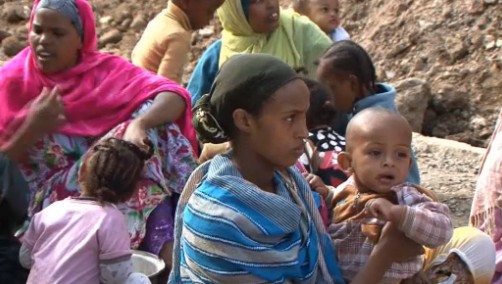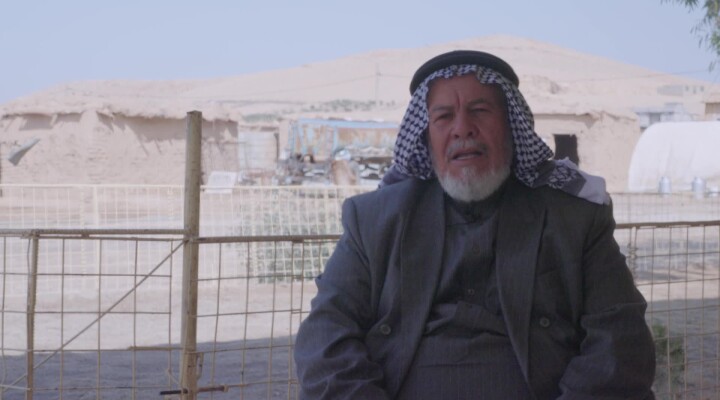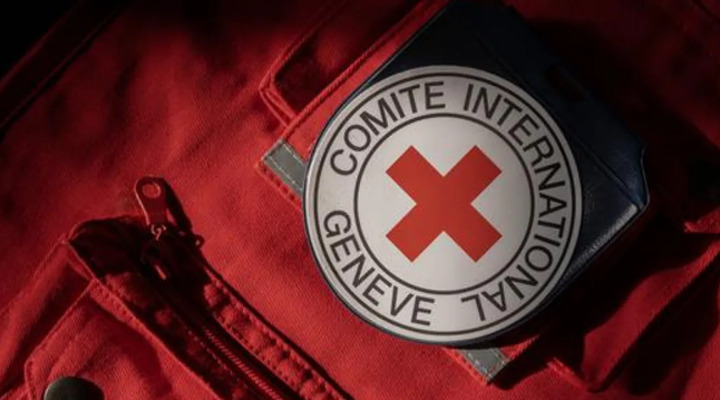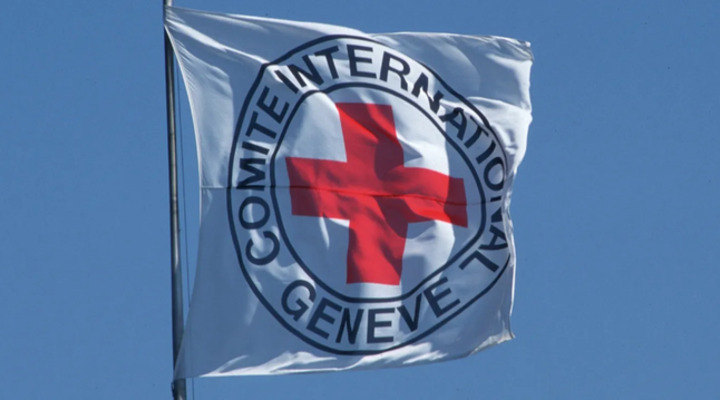ICRC calls for help for victims of human trafficking in Yemen

This is a modal window.
So far this year, over 60,000 people (UNHCR) have attempted the perilous journey from the Horn of Africa, across the sea into Yemen, often in a bid to make it to the Gulf States. The driving factor is poverty with the belief that there are good work opportunities awaiting them - but many end up in illegal smuggler camps.
Each day migrants die on this journey. Others are arrested and some give up and choose to come to this deportation centre in desperation. They want to be sent back to their country – yet the system that allows them to go back home is often slow and lacks the proper funding– leaving these migrants stuck with no end in sight.
Bashir Salissou from Nigeria has no passport and has been waiting a year and three months here in the centre to be deported. Salissou explains how he was arrested and brought here. He's exhausted and struggles to explain his situation in English:
"My wife is calling me crying. I have five small children and there is no money for school fees or food. We don't have anything. The Yemeni government is telling me if I don't have money or passport, they can't send me back to Nigeria."
How Salissou came to Yemen is unclear but many here in the centre are trying to forget the horrors they experienced at the hand of smugglers. ICRC's Alexander Grif explains:
"Most of the people who arrive here are malnourished, dehydrated and in shock. They have a journey of months behind them. Yemen is normally a transitory country for them, but they get caught up here, caught by smugglers or arrested. They face dangers like deprived of their freedom, extortion, and ill treatment before they get transferred here where they face once again inhumane conditions, and they are forced to stay here for months and months because the deportation system, the system that allows them to go back home, is often not working properly."
Conditions in the centre are dire. It is already operating at double its capacity, sometimes reaching three or four times its capacity with 900 migrants. An Ethiopian migrant complains to Grif: "Water is coming here on the floor from the toilet, when we wash our hands or use the toilets. This water comes into our mattresses, and when it rains, the water comes in too."
He has been travelling for months. Things were so bad that for two months he slept outside the deportation centre just hoping to get in to be sent back home: "Yes, I intend to go back to Ethiopia. I have been here for 3 days and there's been no fresh water supply during that time. This is the place where we sleep, wash and spend our time. When it rains, it rains right here. When it’s windy, the wind blows in here."
New arrivals are confined to the basement: "This is the room for newcomers," explains Grif, "where people are brought and kept for the first two weeks up to one month before they are allowed to mingle and stay with the other people because most of them want to escape from this place, so they are kept here in this specific room before they are allowed or transferred to another room."
The Yemeni government says it cannot cope with the tens of thousands of migrants it receives each year and has already spent the budget for 2013 and 2014. "Plane tickets are expensive and food, drink and accommodation – blankets for the cold," states Colonel Abdallah Ali Mohsen Al Razama. "We need more space. We need vehicles to transport people but we cannot don't have the resources. This is a humanitarian situation, and we wish we could do more, because we want to help the people, and we want to serve our country."
So far, in 2013, the ICRC with the Yemeni Red Crescent has helped more than 2,000 migrants with regular food and hygiene distributions to try to ensure their treatment and conditions of detention meets internationally recognized humane standards.
"The ICRC has been working in the deportation centre for over 6 years, assisting people in need," says Grif. "This is not something that the ICRC is normally doing, but given the grave humanitarian situation and the suffering you see all over the place, it's something we felt we needed to do in order to improve the situation a bit. But as you can see more needs to be done to help these people."
Migration in Yemen
- According to UNHCR, Yemen receives over 80,000 migrants a year and 420,000 migrants in the last 5 years
- IOM estimates more than 25,000 Ethiopians are still in illegal smuggler camps in Yemen
- 98% of the migrants in the Sana'a deportation centre are Ethiopian
- 25,000 migrants return to their home country voluntarily each year from Yemen
ICRC and the Centre of Migration and Passport Agency, Sana'a, Yemen
- In 2013, the ICRC improved the water infrastructure in the center and constructed a new washing area
- In 2013, the ICRC completed the construction of a playground for children in the center.
- In 2014, the ICRC will shift its priorities in the deportation center towards the protection of migrants.
- The ICRC has been coordinating their efforts in the Deportation Centre with the International Organisation for Migration (IOM) and Médicins Sans Frontières (MSF). The IOM doctor sees 40 to 60 patients a day and his primary concern is diarrhoea due to the bad hygiene conditions. The MSF psychologist sees 4 to 5 patients a day who often have sleeping problems struggling with nightmares of the torture they've faced at the hands of smugglers.
Extra information on the ICRC in Yemen?
As part of its activities in 2012, the ICRC:
- distributed food to over 317,000 people and household items to 278,000 and supported income-generating initiatives that helped 900 returnee families;
- ensured that almost 400,000 people had safe drinking water and delivered water by truck to over 30,000 people;
- supported four orthopedic centers, treating over 37,000 people with disabilities and trained 49 orthopedic technicians and physiotherapists;
- carried out repairs and rehabilitation to health facilities, supplied drugs and materials and deployed a surgical team who trained staff and carried out 70 operations;
- visited nearly 5,400 detainees and helped detainees in Guantanamo and Afghanistan keep in touch with their families
Shotlist
Location: Centre of Migration and Passport Agency, Sana'a, Yemen
Length: 9:10
Format: Mov HD
Producer: Marie-Claire Feghali & Nicola Fell
Camera: Abdelrahman Al Ansi & Sami Mohammad
Editor: Nicola Fell
Sound: Arabic & English
ICRC ref: AV138N Yemen
Production dates: 26 November 2013
Copyright: ICRC access all
0:00 Various GVs of Sana'a, Yemen
0:44 Exterior shots of Centre of Migration and Passport Agency, Sana'a, Yemen with a woman clinging to door and a young girls face from behind bars
1:02 GVs of Center's courtyard
1:59 Bashir Salissou talking to Alexander Grif, ICRC delegate
2:02 SOUNDBITE Bashir Salissou, Nigerian migrant (in broken English):
ICRC delegate asks: "You were arrested and brought directly to the centre?"
" Yes, I've been here 1 year and 3 months. Every time people come and tell me lies – this week, next week, second week, next month. I don't know"
2:19 "Maybe from Thursday, the Saudi Embassy will call me and send me my passport maybe this week, maybe next week. I don't know"
2:30 "My wife is phoning me crying. I want somebody to help me go back"
2:35 "The wife is calling me crying. I want somebody to help me go back"
2:35 "I want to go back with my family. I have 5 small children but no money for school fees or food or anything. That's my problem. The government of Yemen told me you don't have a passport or money. If you have money, we can send you to Nigeria. That's my problem. I don't have money"
2:57 ICRC delegate
3:02 Queue for soap distribution
3:07 SOUNDBITE Alexander Grif, ICRC Protection delegate, Sana'a Yemen (in English)
"Most of the people who arrive here are malnourished dehydrated and in a shock, they have a journey of months behind them, coming from their country of origin, and trying to travel to Saudi Arabia or other countries. Yemen is normally a transitory country for them, but they get caught up in here, caught by smugglers or arrested. They face dangers like deprivation of freedom, extortion, and ill treatment before they get transferred here where they face once again inhumane conditions, and they are forced to stay here for months and months because the deportation system, the system that allows them to go back home is often not working properly."
3:50 Alex walking
3:54 Various of sleeping room in centre
4:15 SOUNDBITE: Anonymous migrant (in Arabic)
"Water is coming here on the floor from the toilet, when we wash our hands or use the toilets. This water comes into our mattresses, and when it rains, the water comes in too."
4:34 Various of sleeping room in centre
4:50 SOUNDBITE: Anonymouns migrant (in Arabic)
"Yes, I intend to go back to Ethiopia."
5:06 "I have been here for 3 days and there's been no fresh water supply during that time. This is the place where we sleep, wash and spend our time. When it rains, it rains right here. When it’s windy, the wind blows in here."
5:25 men behind bars
5:34 ICRC delegate entering basement
5:46 SOUNDBITE Alexander Grif, ICRC Protection delegate, Sana'a Yemen (in English)
"This is the room for newcomers where people are brought and kept for the first 2 weeks up to one month before they are allowed to mingle and stay with the other people because most of them want to escape from this place, so they are kept here in this specific room before they are allowed or transferred to another room."
6:10 Various of basement
6:30 ICRC delegate leaving basement and door being locked
6:41 CU of man behind bar
6:51 SOUNDBITE Colonel Abdallah Ali Mohsen Al Razama, Yemen government (in Arabic)
"Plane tickets are expensive and food, drink and accommodation – blankets for the cold. We need more space. We need vehicles to transport people but we cannot don't have the resources. This is a humanitarian situation, and we wish we could do more, because we want to help the people, and we want to serve our country."
7:55 Various of migrants receiving soap
8:17 SOUNDBITE Alexander Grif, ICRC Protection delegate, Sana'a Yemen (in English)
"The ICRC has been working in the deportation centre for over 6 years, assisting people in need. This is not something that the ICRC is normally doing, but given the grave humanitarian situation and the suffering you see all over the place, it's something we felt we needed to do in order to improve the situation a bit. But as you can see more order needs to be done to help these people."
8:50 Various of women and children in the centre
9:10 END



